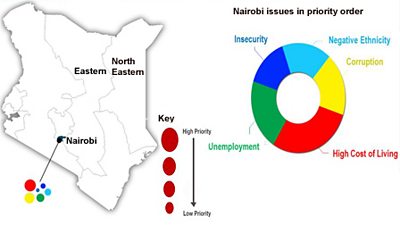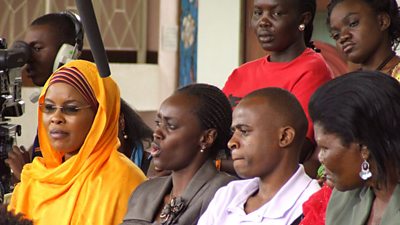Downloads
Publication date: July 2012
Summary
- Some of the most current pressing issues affecting Kenyans were reported as unemployment, the high cost of living, negative ethnicity (loyalty to one’s ethnic group above loyalty to the state), poverty and corruption.
- The inaccessibility of Kenyan politicians and the threat of retaliation were viewed as the principle barriers to Kenyans being able to question and receive answers from their leaders.
- Sema Kenya (Speak Kenya) is a ���˿��� Media Action programme funded by a Global Grant through the UK’s Department for International Development. It aims to provide a constructive platform for Kenyans to voice their concerns about issues that affect them and directly address politicians and public officials.
Context
The Kenyan national elections of 2007 were plagued by widespread violence. Media was central to the conflict and many local language radio stations played a role in calming tensions as well as inflaming them. As Kenyans prepare for the next elections under a new constitution, the country is keen to avoid a repeat of this conflict. This time, it is hoped that the media will play a positive role by promoting dialogue and allaying ethnic tensions. In the lead-up to the 2013 national elections, the ���˿��� Media Action programme Sema Kenya will provide a platform for Kenyans to directly address and question politicians and public officials and contribute to a national conversation about issues that affect their lives.
The project
Sema Kenya is a multimedia public debate programme produced in the Kiswahili language. The programme will provide opportunities (on radio, television and via social media and mobile phones) for Kenyans to engage in dialogue with their public leaders by directly questioning them on important issues. The programme commences five months prior to the 2013 Kenyan national elections and will continue until the end of March 2013. A total of 24 episodes will be shot in different locations across Kenya, as part of an outreach programme to connect with communities in media dark areas. Capacity-building partnerships will also be established with six vernacular stations to support presenters and programme makers.
Methodology
In April and May 2012, 22 focus groups with members of the general public were conducted across all eight provinces of Kenya. The aim of the research was to inform programme development by understanding the issues that affect Kenyans in daily life and gauge public opinion on the new constitution, election-related violence and the role of the media in governance and accountability. ‘Temperature maps’ were created to show the most important issues affecting each region of Kenya. These were complemented by eight focus group discussions to test the debate concept.

Findings
The key issues participants reported affecting people across Kenya were unemployment, high cost of living, negative ethnicity, poverty and corruption. Unemployment and poverty were mentioned in almost all of the provinces highlighting the importance and commonality of these. Overall, the high cost of living and poverty were felt to be the most pressing issues affecting Kenyans. The ‘temperature map’ on the right shows the top issues currently affecting residents of Nairobi, where in addition to those issues mentioned above, insecurity also featured. Their perceived Nairobi Province Temperature Map magnitude is shown by circle size with the largest circles representing the biggest issues.
Participants described how Kenyans must take responsibility for their own development. However, many reported facing barriers in terms of holding their leaders to account due to the threat of retaliation and the inaccessibility of their leaders.
"We have no access to our leaders. We cannot complain about the things that are going wrong in this place... we can’t question them about the wrong things they have done. We feel powerless. They get elected and immediately move to Nairobi…when they come back in their big cars they don’t even roll down their windows. We don’t see them until it is time for elections and they come and flash money around." - Respondent, 24-35 years, Eldoret
There was enthusiasm about the new constitution but knowledge of its implications is limited. Many participants had high expectations of the new constitution, viewing its implementation as a solution to all problems.
"I like the fact that in the constitution, there are clauses which allow the citizens to recall elected leaders who are not effective and I think this gives us power to scrutinize the performance of our leaders." - Respondent, 45+ Years, Kwale
There was a feeling among participants that they did not want to witness violence again. The majority were optimistic that with the full implementation of the constitution and the resolution of long standing issues, there would be a reduced likelihood of violence.
Early audience concept testing of the question and answer programme format revealed that there was a desire among audiences for programming that focuses on issues as opposed to party politics. This format was preferred and deemed necessary in the Kenyan context. Some skepticism was expressed as to whether Kenyan politicians were “mature enough” to participate in such a programme. People wanted to see a wide variety of panelists, not only politicians but members of civil society, religious leaders and experts. They suggested that the programme travel across the country to give a variety of people access to leaders.
Implications
The media has an important role to play in managing expectations around the new constitution and encouraging people to fully participate in governance issues. ���˿��� Media Action research has shown that there is a demand for a programme that enables ordinary citizens to engage directly with their leaders. A programme like Sema Kenya can inform voters about governance issues like the new constitution in the lead up to the national elections. The question and answer format of Sema Kenya provides a safe platform It can encourage constructive dialogue between public officials and citizens and the sharing of diverse views without inciting violence.
